7 LGBTQ+ issues Liz Truss needs to urgently prioritise, from conversion therapy to hate crime
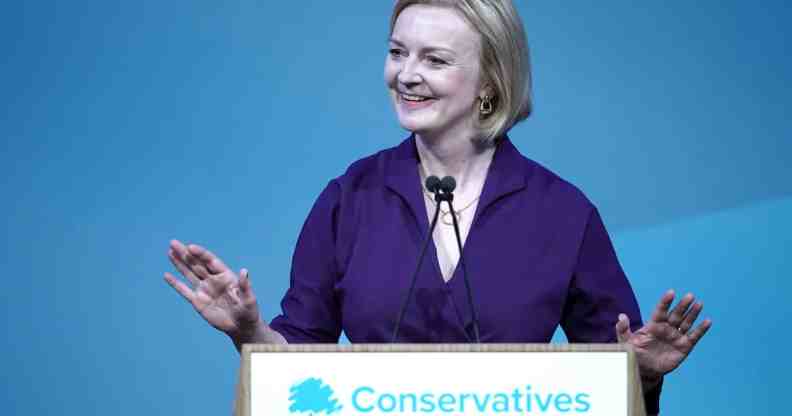
Liz Truss is announced as the next Conservative party leader, at the Queen Elizabeth II Centre in London. (Christopher Furlong/Getty Images)
Among leading LGBTQ+ activists, there is a marked lack of faith in new prime minister Liz Truss.
Truss assumes power after a leadership race marred by anti-trans rhetoric and a stint as equalities minister defined by inaction. While LGBTQ+ Tories have urged her to build bridges with the community, she faces an uphill battle.
Lisa Power, a veteran LGBTQ+ activist, told PinkNews: “She’s been no use in any job she’s had so far and I don’t expect things to improve any time soon.”
And others echoed that sentiment. Christine Burns, editor of Trans Britain, doesn’t even expect Truss to last long enough as prime minister to be able to build relations with the LGBTQ+ community.
“She’s likely to be a short term prime minister – I don’t think she has the talent or vision to be anything more,” Burns said.
“She’s not the choice of MPs. Legislating anything substantial takes time, stability and discipline among her ministers. I don’t think she’ll get much done but I’d be happy if at least culture wars were off the table.”
In her first weeks in office, Truss will be expected to tackle spiralling energy costs in a desperate bid to help struggling households make ends meet. But LGBTQ+ people will also be watching closely to see what she will do to advance equality.
As Truss steps through the doors of 10 Downing Street, we look at seven key issues Truss and her government should consider, to make life better for LGBTQ+ people in the UK.
1. Liz Truss must ban conversion therapy for all LGBTQ+ people
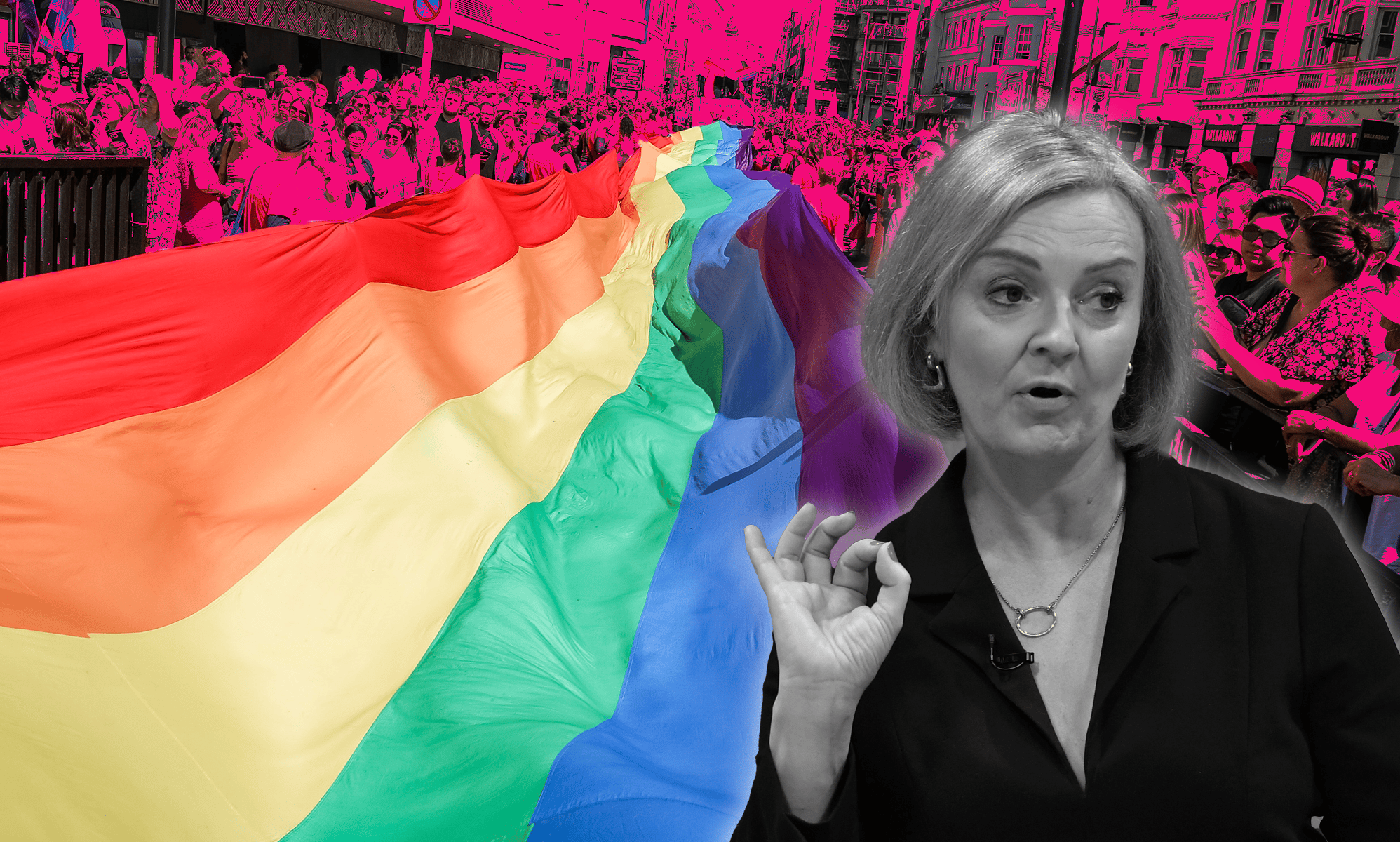
LGBTQ+ advocates and organisations warned Liz Truss becoming prime minister would be concerning for the UK’s queer community. (Getty)
Perhaps the easiest win for Liz Truss, in terms of advancing LGBTQ+ rights, would be to ban conversion therapy for all people.
The UK government first promised to ban conversion therapy in 2018, under Theresa May’s leadership, but the practice remains legal to this day. Boris Johnson vowed to outlaw it, and made moves towards doing so – but decided trans people should be excluded from the ban. He left office without legislation being bought forward.
Cleo Madeleine, communications officer at Gendered Intelligence, told PinkNews Truss managed to make some headway on conversion therapy during her time as minister for women and equalities. She must now push ahead with banning the practice entirely.
“She has the opportunity now to both rebuild bridges and show the country she can keep her promises by pressing on with the ban and ensuring it protects the whole LGBT+ community.”
Carolyn Mercer is a trans conversion therapy survivor. She hopes Truss will move away from “anti-trans rhetoric” she used during the leadership race and instead focus on strong LGBTQ+ policies.
“Banning all conversion ‘therapy’, for example, would be relatively simple and is already enacted in many other countries – and supported by all devolved governments in the UK,” Mercer told PinkNews.
“I know this is not the highest priority for many but for all those affected it will be life enhancing and, for some, life saving.”
2. Truss must scrap the Rwanda plan
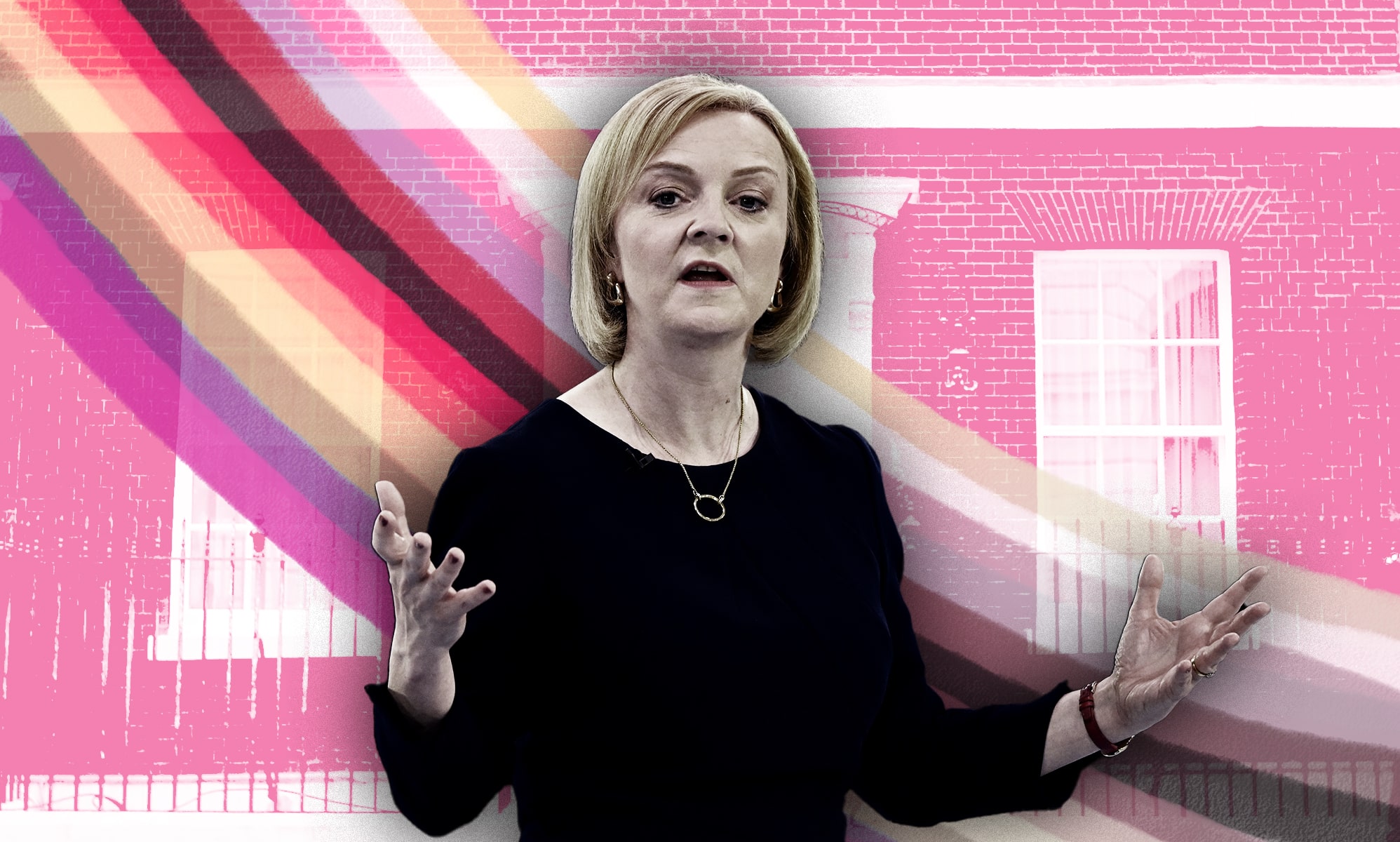
Liz Truss is Britain’s next prime minister. (Getty)
Priti Patel’s plan to deport asylum seekers, arriving in the UK via the English Channel, to Rwanda has faced relentless criticism – it’s currently facing legal challenges, too.
Daniel Sohege is director of Stand for All, an advocacy organisation for asylum seekers. In an ideal world, he would like to see Truss scrap the policy entirely and to take a more humane approach to those seeking asylum.
“There is no doubt that this policy will put LGBTQ+ individuals at increased risk,” Sohege told PinkNews.
“I think the government needs to start recognising that people have very good reason for seeking asylum in the UK.”
Sohege would like to see the government trying to make it “safer and simpler” for people to come to the UK to claim asylum.
“Any principle of an asylum policy has to start on the basis of protection and inclusion,” he said.
“In the wider context, to do with the LGBTQ+ community, there needs to be a real focus on ensuring protection because we’ve seen more than 3,000 LGBTQ asylum seekers sent back to countries which have massively homophobic laws in the last five years.
“There’s a very high rate of denials for LGBTQ+ people and that needs to be addressed rapidly.”
3. Gender Recognition Act reform should be back on the table
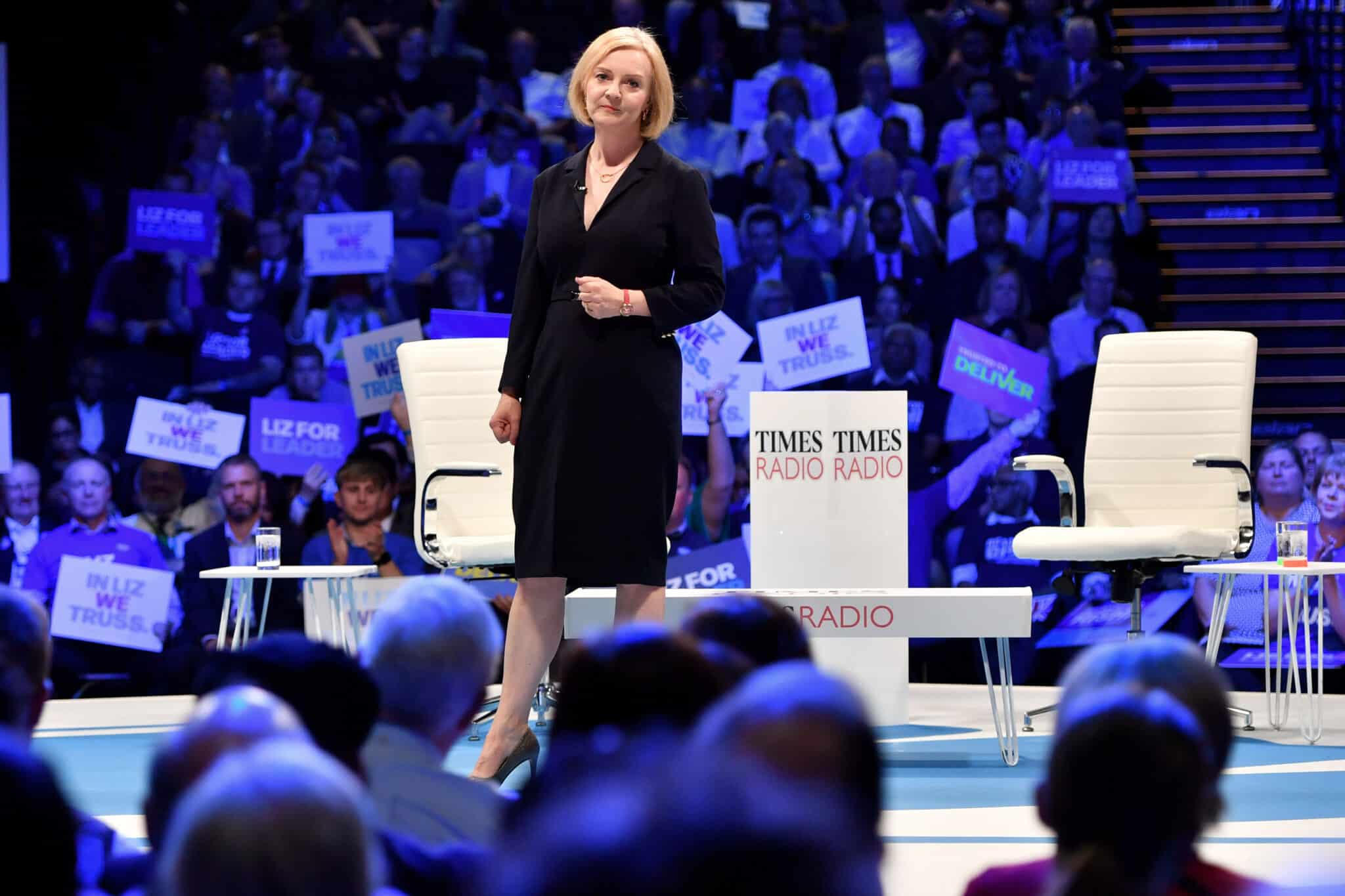
Liz Truss speaks on stage on 23 August, 2022. (Anthony Devlin/Getty)
It was during her tenure as minister for women and equalities that Liz Truss decided not to push ahead with Gender Recognition Act (GRA) reform first mooted by Theresa May’s government. This was despite the fact the government’s own public consultation showed broad support for change.
Now that Truss is prime minister, she should urgently consider introducing GRA reform that would allow people to self-declare their own gender. She should also introduce non-binary gender recognition.
But Cleo Madeleine of Gendered Intelligence isn’t holding out much hope – she says the issue is likely to be kicked down the road due to a small-but-vocal group of “gender critical” activists and their opposition to trans rights.
“It’s hard to be optimistic that Truss will finally deliver on the commitments she made in 2018,” Madeleine said.
“With the Tory party’s reputation in shreds and approval plummeting, getting these reforms done could change the narrative on LGBT+ issues in the UK and start to clean up some of the mess left by the last government.”
4. Liz Truss must work on improving trans healthcare
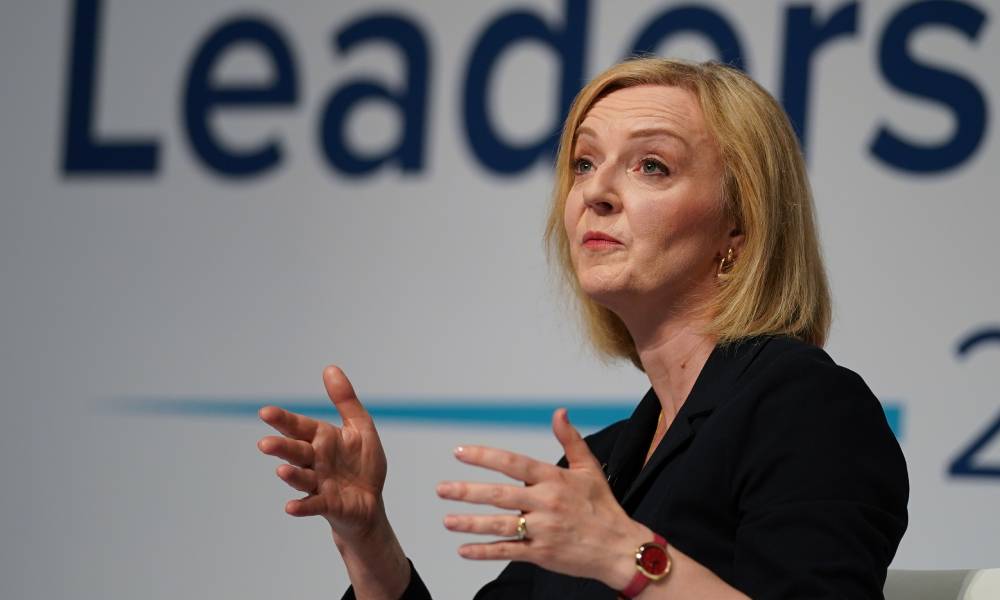
Liz Truss. (Getty/Ian Forsyth)
Gender-affirming healthcare on the NHS is already at breaking point, with trans people facing three to five-year waiting lists depending on where they live, leaving many with no choice but to go private.
The situation is so bad that the High Court is set to hear a legal challenge against the NHS over the “life-threatening” waiting times. One claimant, Eva Echo, described the situation as “torture”.
“I felt like I may not even be alive long enough to receive my first appointment,” Echo said.
The NHS has taken first steps towards addressing the situation, announcing that the country’s only clinic for young trans people will be replaced with a series of regional pilot centres. But more must be done.
5. Anti-LGBTQ+ hate crime needs to be urgently addressed
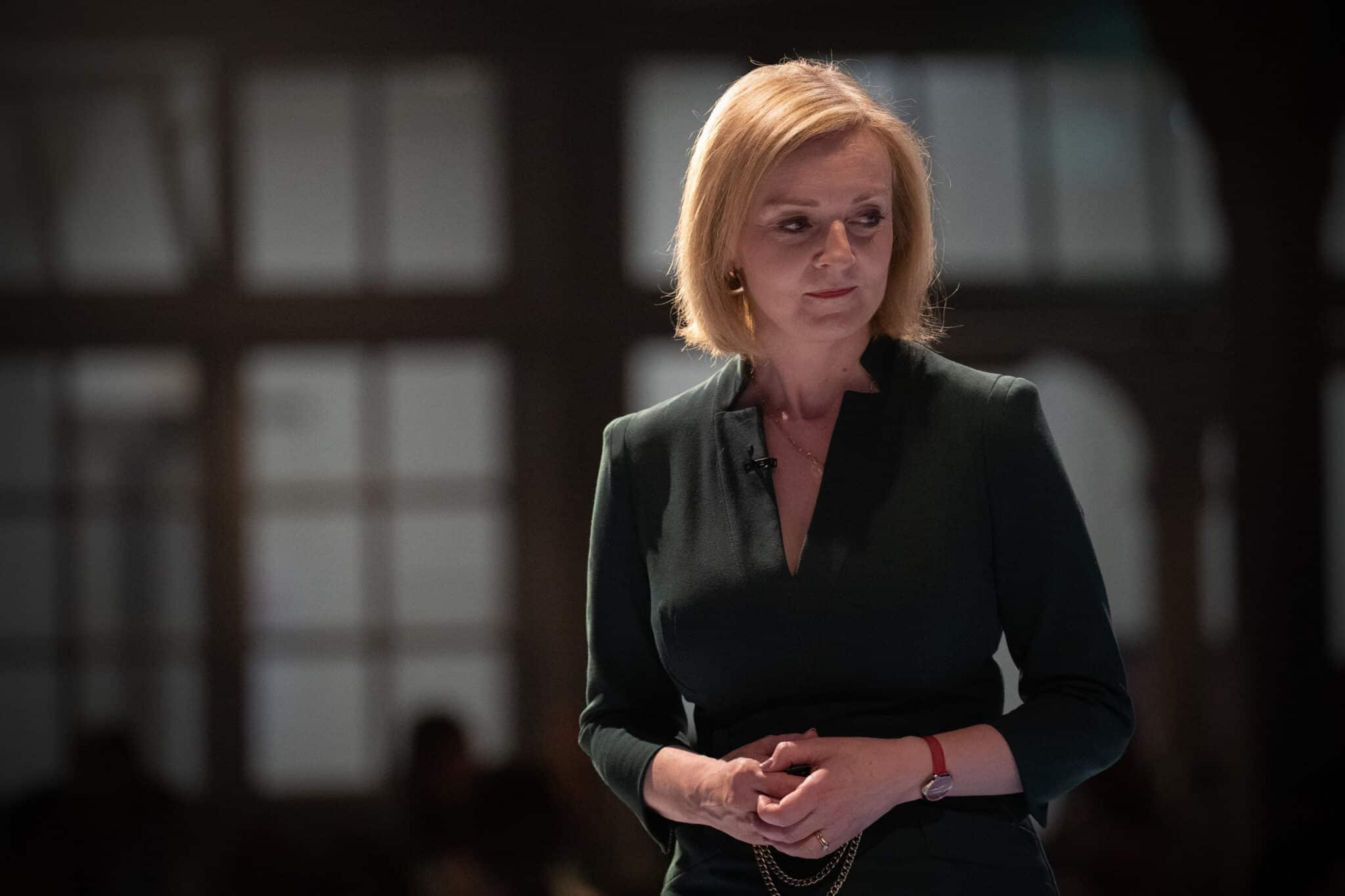
Liz Truss speaks at a Conservative party leadership hustings on 5 August, 2022. (Carl Court/Getty)
Anti-LGBTQ+ violence is spiralling out of control in the UK, yet the government has so far shown little interest in doing anything about it.
Figures show anti-LGBTQ+ hate crimes in the UK increased by 32 per cent over the past year, while transphobic hate crimes were up 240 per cent.
The data, obtained by Vice World News, paint a damning picture of a country hurtling rapidly into hate-based violence and aggression.
It’s just one of the issues trailblazing LGBTQ+ rights activist Peter Tatchell would like to see Truss’ government focus on.
“We need to see Truss improve trans healthcare, tackle anti-LGBT+ hate crime, expand funding for sexual health clinics and ensure a faster roll out of the monkeypox vaccination programme,” Tatchell told PinkNews.
6. LGBTQ+ homelessness needs to be tackled by Liz Truss’ cabinet

Liz Truss speaks during the second Conservative party membership hustings on 1 August, 2022 in Exeter. (Finnbarr Webster/Getty)
It is thought that around a quarter of young homeless people in the UK are LGBTQ+ – but government policy has done little to tackle this deep-seated problem.
If Liz Truss wants to improve life for the most vulnerable LGBTQ+ people, she could start by improving access to safe, affordable housing across the board.
akt, a charity that works to end LGBTQ+ homelessness, said: “LGBTQ+ young people largely remain hidden within official homelessness statistics, and are more likely to face housing insecurity and encounter discrimination when renting privately and interacting with support services,” an akt spokesperson said.
“Pathways into affordable, safe, and inclusive housing for these young people are desperately needed. akt will continue to work with government and other critical partners to make this a reality.”
7. Liz Truss should scrap plans to replace the Human Rights Act
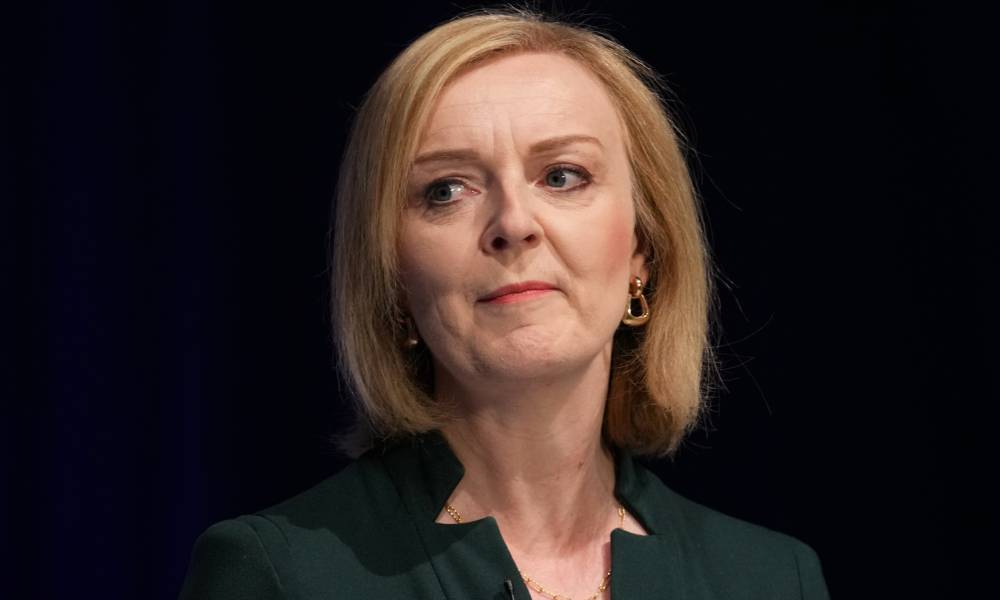
Liz Truss. (Getty/Carl Court)
Experts have repeatedly expressed concern about the government’s efforts to repeal and replace the Human Rights Act with a Bill of Rights.
Dominic Raab has said the Bill of Rights would “curb abuses of the system and reinfect a healthy dose of common sense” by strengthening rights such as freedom of speech – but human rights activists aren’t convinced.
Lubna Shuja, vice president of the Law Society, told PinkNews Truss should “start again and completely rethink the current Bill of Rights bill”.
“The Bill of Rights bill in its current format is not fair or just. It removes legal protections, disempowers people in Britain, and reduces state accountability for rights beaches, thereby giving the state more unfettered authority. That is not British justice.
“If this bill is passed it will make it harder for people to enforce their rights in the courts and reduce the availability of effective remedies.
Shuja added: “If this bill becomes law in its current form, it will create enormous legal uncertainty overnight. It will no longer be clear whether settled law in place for many years will still apply, and anyone who relies on those judgements could no longer be sure of their legal obligations or rights.”

